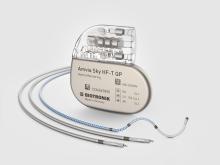Women’s History Month: Celebrating the Women Who Helped Shape Cardiology
Women’s History Month is the perfect time to celebrate the incredible achievements of the women who have shaped the field of cardiology.

Although women remain underrepresented in cardiology, we can take inspiration from the trailblazing women who have made outsized contributions to the field since the very beginning. The contributions of these remarkable women have left an indelible mark on cardiology, and they deserve to be recognized and celebrated. Here are some of the pioneering women in cardiology who have inspired us this International Women´s Day:
Maude Abbott – Congenital Breakthrough in the 1930s
Maude Abbott was a Canadian cardiologist who graduated as the only woman in her class at Bishop’s University in 1894 – winning the Chancellor’s Prize while doing so. Even so, she faced prejudice after graduation and couldn’t find a position at a Canadian hospital. She headed to Europe to finish her training and came back to Montreal, becoming the assistant curator of the McGill University Medical Museum in 1898.
Around that same time, she opened her own practice in Montreal and began specializing in caring for women and children, fast becoming an authority on congenital heart defects, particularly in newborn babies. She is credited with having saved the lives of many such newborns.
Eventually, Abbott became a professor in McGill University’s Pathology department, and published more than 100 papers and books before retiring in 1936 – the same year she wrote what is perhaps her crowning achievement, the Atlas of Congenital Cardiac Disease. Using over a thousand clinical and post-mortem case records, the Abbott’s Atlas pioneered a new classification system for congenital heart disease. It remains a defining piece of literature in the field.
Helen B. Taussig – Pediatric Cardiology Pioneer
A graduate of Johns Hopkins School of Medicine who went on to head the university hospital’s pediatric unit, Taussig is widely recognized as the founder of modern pediatric cardiology. Forging ahead based in Maude Abbott’s groundwork on congenital heart disease, Taussig proposed an operation that would correct the congenital heart defect responsible for so-called “blue baby” syndrome. Just three years later in 1944, the operation was successfully performed for the first time. It was for this achievement that then US President Lyndon B. Johnson awarded her the Presidential Medal of Freedom – the highest civilian honour in the US. In 1965, she became the first woman to be President of the American Heart Association.
Myra Adele Logan – Trailblazing Surgeon
Born in the US state of Alabama in 1908 as the eighth child of Warren and Adella Hunt Logan, young Myra’s mother was active in the suffragette movement and had a college degree. Her parents defied the norms of the time, especially for African Americans, and Myra had plenty of encouragement from home during her studies. She graduated as valedictorian in 1927 from Atlanta University and later earned a Master in Psychology from Columbia University.
In 1933, she would begin working in Harlem Hospital’s emergency room and only a decade later, in 1943, she became the first woman in the world to perform open-heart surgery. What’s more, open-techniques were so new at the time that Logan was also only the ninth person in the world to have performed the surgery at the time.
In the 1960s, her research into breast cancer saved many lives, by developing a more accurate x-ray that could detect tumours earlier. Throughout her whole career, she remained dedicated to many causes, volunteering much of her time. She served on numerous organization committees, including the National Association for the Advancement of Colored People (NAACP) and Planned Parenthood.
Celia Mary Oakley – A Leader in British and European Cardiology
Having graduated from the Royal Free School of Medicine in 1954, Celia Mary Oakley was one of the first women to practice cardiology in the United Kingdom. Starting as a house physician at the Royal Free School, she eventually spent most of her career at Hammersmith Hospital. There, she formed part of the team that coined the term hypertrophic cardiomyopathy, where the heart muscle thickens, impairing its function.
Considered one of the most outstanding cardiologists of her era, Oakley was one of the founding members of the European Society of Cardiology (ESC), which now represents over 80,000 professionals in 57 member countries. Its annual congress is the world’s largest cardiology congress. From 1995 to 1998, she served as Chair of the ESC’s working group on valve disease.
During Women's History Month, we celebrate the legacies of the pioneering women in cardiology while acknowledging that there is still a long way to go in improving the representation of women in this field. Fortunately, there are several organizations committed to advancing this goal, such as Women in Cardiology (WIC) and Women in Innovations (WIN) for female interventional cardiologists in the US, the European Society of Cardiology Women in Cardiology (ESC WIC), and Women In Cardiology in the UK.
These networks are just a few examples of the many resources available to women or female physicians in cardiology around the world. They provide valuable opportunities for networking, mentorship, and support, helping to promote greater gender equity and diversity in the field.
We hope that the inspiring stories of female pioneers in cardiology will encourage young girls everywhere to follow in their footsteps.





















